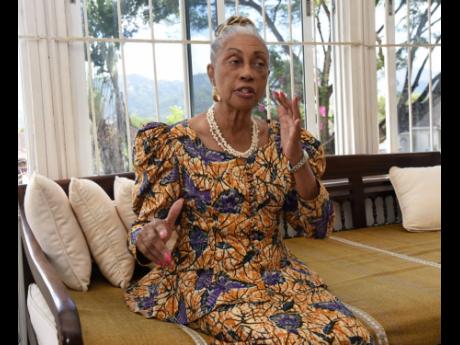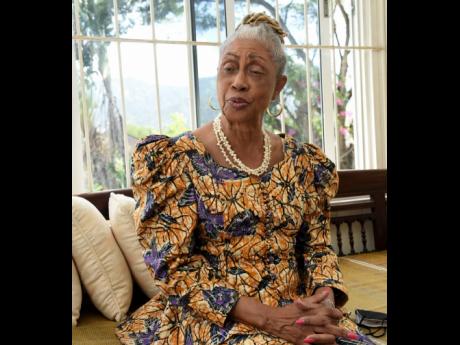The broadcaster who became a force to be reckoned with
Beverley Manley-Duncan speaks about her political and ideological loves
She may be 80 years old, but Beverley Manley-Duncan’s unmistakable voice still commands attention, whether it’s coming to you through the airwaves, the phone, via a YouTube video or if she is sitting across from you.
She has also been the voice behind many political advertisements. Who can forget “150,000 strong can’t be wrong” as the 1980 general election was announced from Montego Bay’s Sam Sharpe Square?
Her presence is even more commanding. Tall, stately and elegant, her mind is still agile and in a sit-down with The Sunday Gleaner last week, she effortlessly recounted the discourse around the 1970s social and political revolution by the People’s National Party (PNP).
Beverley Lois Anderson was the athletic, model and Afrocentric beauty the handsome Michael Manley married in 1974, much to the chagrin of the well-heeled, who were banking on their daughters to win the heart of the upper-classed Manley, whose father, Norman, was a brilliant barrister and the co-founder of the PNP who served as premier of Jamaica.
The marriage triggered a flood of hate mail, as many Jamaicans lashed Beverley for several reasons, chief among them the fact that she was not of his social class and that she was black. She endured it all with a brave face, smiling through the pain. Then, it had hurt. Now, not so much.
Their union produced two children, daughter Natasha and son David. A nasty whispering campaign had emerged about the children’s paternity, but they would soon bear the Manley stamp of nose and ears, sporting the broad Manley smile in pictures seen.
“He was shocked at the hits he was taking from the upper class. The Manleys could have been rich, but they weren’t. They were privileged. He was always aware that he did not have a lot of his social class with him. I was thinking about him last night and it occurred to me that he was a risk taker. I have never called him that before. Even when he married me, it was a big risk,” Manley-Duncan told The Sunday Gleaner last Thursday.
Why?
“Because I was black and had an Afro. Suppose I show you the hate mail I got because I wouldn’t straighten my hair and I wore clothes like this (made from African prints). Jamaica not easy, you know. Because he could marry anybody he wanted, so he would have known he was taking some big risks,” she shared.
He kept on saying, “Beverley, how they don’t get it?”
Transforming Jamaica in the middle of a Cold War
Beverley was beside Michael, the ideological and political firebrand, and both found themselves in the middle of the bitter geopolitical struggle to divide the world into East and West, communism and capitalism. A political Cold War was being fought on frigid fronts.
Jamaica – never too far then from the centre of anything political, social or economical – found itself in the middle: not capitalist, not communist, but democratic socialist, and that was how the fight started.
Beverley called it “an almost civil war”.
She was an unapologetic participant in the quest to transform Jamaica into an egalitarian society and was an integral part of the policy and legislative initiatives that would shift the economic and class divide in Jamaica.
The plan was to empower the masses through institutional and legislative changes.
“It was almost 50 years of what we call struggle and advocating on behalf of the most marginalised in Jamaica – because that is what the PNP was founded for. If you look at our founding documents, that’s what it said. We are here through an alliance of classes to cater to the most marginalised in the society. And 50 years later, they are,” she said.
“A number of people are still marginalised,” she added with some sadness.
“My political philosophy is democratic socialist, which distinguishes itself from communism and scientific socialism. One of the distinctions is that we are democratic, and with the PNP, we are democratic from the bottom up, and we believe in genuine participation and not just consultation. It’s not always easy, but the effort must be made,” Manley-Duncan said.
“If anything hurt Michael more than anything else it was that people thought he could be authoritarian. He never understood that concept. His parents never understood how anybody could be autocratic. He was so incensed,” she recalled.
Manley was accused of betraying his class by wanting to create a society of “uppity niggers”; he did not resile from that quest.
“We were shifting the balance of power in the ‘70s. That’s why everybody needed to be educated. We were doing it so it (the society) could become more equitable. We were doing it for men and women – for women, and wherever men showed up in the gender equation, we would bring them up,” said the renowned women’s rights advocate.
There is now almost a total reversal of those efforts, she sadly reflected.
A foot soldier in the governance process to provide universal healthcare and education to all, especially the masses, Beverley experienced the resistance from connected classes who clutched their pearls of economic superiority and engaged in capital flight that left the country without foreign exchange.
Food marriages and economic shutdown
Beverley travelled the country in groundings with her sisters in the Committee of Women for Progress (the women’s arm of the Workers Party of Jamaica), the PNP Women’s Movement, and others, seeing first hand the struggles women endured.
She saw, too, how the economic destabilisation campaign affected the most vulnerable and witnessed the process of food marriages never seen before or since. What basic food items were available were bonded with others that had longer shelf lives, and pairings adjusted on the whims of shopkeepers and retailers. One could not purchase kerosene oil without also buying bath soap; sanitary napkins were tied to carrot juice; bath and washing soaps to clothes pins; counter flour, sugar, cornmeal to anything the shopkeeper chose; condensed milk, baby food and salt fish were unavailable. So, too, was toothpaste and rice.
Cuba stepped in and Jamaica was able to get some basic supplies in an arrangement much like the PetroCaribe oil agreement with Venezuela under Carlos Andres Perez.
It would later emerge that many supermarket operators, especially the Chinese, were encouraged – and some paid – by private sector interests to stockpile goods. Having fled China under Mao Tse Tung (Mao Zedong) or Chairman Mao, they were not about to meet communism face to face in Jamaica. This was where Jamaica was heading, notwithstanding Manley’s declaration that Jamaica was a democratic socialist society.
Talk radio, struggle to survive post-1980
Election defeats are emotionally draining, Manley-Duncan told The Sunday Gleaner, and the 51-9 trouncing the Edward Seaga-led Jamaica Labour Party (JLP) gave the PNP was no different. Political violence escalated and at least 800 people were murdered. After the defeat, many Comrades realised they were broke and homeless. Nation-building, to them, was not about lining their pockets or bank accounts, but building people.
Beverley Manley, too, had to find a job.
The broadcaster shared a successful morning talk show called ‘The Breakfast Club’ on both KLAS FM and Hot 102 FM in an unlikely alliance with former JLP Member of Parliament Eric Anthony Abrahams.
She recalled promising Abrahams that they would do a three-month pilot after Neville James, who owned KLAS, told Abrahams that he should “get Beverley Manley and come back to me”. The show lasted for years.
Prior to that, it was a real struggle and she praised broadcaster Cliff Hughes, who helped her to put food on her table. She pledged unashamed loyalty to Hughes for giving her a chance when “nobody wanted to touch me, Cliff touched me”.
Brief stints at The University of the West Indies, Mona, teaching politics, and speaking engagements also assisted.
She recalled, too, how Manley would travel overseas to earn money to support his family, sometimes sleeping in the students’ dorms at the universities he was scheduled to speak to avoid exorbitant hotel fees.
The biggest fear, she said, was that Manley would have been assassinated after the 1980s election as attempts were made previously.
“I think it was fairly well known that Michael never wanted the marriage to end. He did everything to prevent it going that way because it was his fourth marriage, but I think we both had nervous breakdowns after the 1980s election loss,” she said.
The marriage fizzled.
‘Beverley Uncensored’
Snippets of her about-to-be-released documentary have emerged in which she talks about issues impacting older women. A clip about sex and older women made its way to social media. The programme will feature issues about which women were forced to pretend but are now free to address.
“Becoming 80, you are unprepared. Well, I should be prepared. For the first time a young man sees you on the street and said, ‘Mum, how you duh, mums?’, and you kinda look ‘round and said, ‘Who is he talking about?’ You just receive it as an elderly person and he is being respectful.
“Or you passing a mirror in your home, and you say, ‘Wait. Who is that? That is not me.’ When it comes to body, how it looks, your feelings, your thinking and you realise just how much you have to put up with in life as a woman,” she said about the issues raised.
Through Beverley Uncensored, she is continuing the democratic process of transformation through conversations. She recalled that during the promotion of her book, the main comment was “if it wasn’t for Michael Manley, I wouldn’t be where I am today”.
Advocates, she said, must be courageous and prepared for attacks.
Beverley was instrumental in the campaign for the Maternity Leave Act, which was passed in December 1979, making women entitled to 12 weeks maternity leave, eight with full pay and four without, with eligibility after completing 52 weeks of employment. The Jamaica House Basic School was also established during her tenure and still exists today.
Grieving D.K. Duncan
In 2012, Beverley Manley married another ideological firebrand in Dr D.K. Duncan, who died in September 2020 after contracting COVID-19. A large photograph of the 1970s radical hangs in the den of her home, eyes piercing and surveying the room. So, too, is a picture of Michael Manley, accessorised with numerous families at different occasions.
She recalled Duncan’s deathbed concern that she would be cared for, as he had made it clear before marriage that he was not rich.
More than a year since Duncan’s passing, she allowed herself time to grieve.
“Of course, I feel down. I didn’t expect this man who came into my life with so much force to leave me. I still talk to him (Duncan) because we shared both a personal and political relationship. I find myself talking to him mostly in the bed. Sometimes we would agree, and then I say, ‘What you doing?’
“He is not here physically, but his presence can be very strong presence,” she related, adding that she does not believe Duncan would have agreed with Michael Manley being on the controversial $2,000 note, which also bears Seaga’s image.
Manley-Duncan is embraced by the Manley and Duncan children, and misses campaigning with D.K. and the trips to Hanover, where he was member of parliament.
Both men in her life embarked on a path to social justice. It is the philosophy that holds people together and she is excited by the PNP’s path today under Mark Golding’s leadership.
As she awaits the release of the documentary and considers the 1970s efforts as the dream deferred, Manley-Duncan said categorically, “Dreams never die.”


